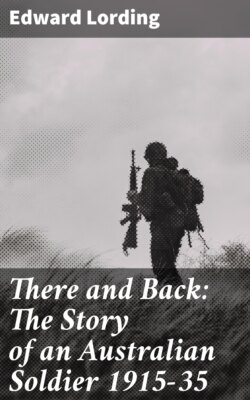Читать книгу There and Back: The Story of an Australian Soldier 1915-35 - Edward Lording - Страница 5
На сайте Литреса книга снята с продажи.
AUTHOR'S NOTE TO REX
ОглавлениеTable of Contents
Much water has passed under the bridge since you came on a hurried visit from Tamworth to see me at Randwick Hospital in August, 1932. Though I do not recollect much of what happened, or nearly happened, during the final six weeks of my half-year sojourn there, I do remember your arrival at my bedside as the jolly old Canon concluded his few last words.
Just what he said to help me over the divide I cannot recall, but I am mindful of your suggestion that I should write a book. Maybe you said that in an heroic endeavour to persuade me, during what seemed to you and others to be my last hour, that my life had been worth something to others; or perhaps you thought that, if I did by any chance recover, a little writing to remind myself of the "wickedly" past would keep me quiet for a while.
Well, I tricked the undertaker once again and proceeded to have a fling ere the family returned from Blighty in the ensuing October. After eighteen months of grass-widowership, the process of getting back to domestic paths and taking up the reins to guide the children (still three, in case you are presumptuous) caused me to forget my troubles and recent associations.
My son and heir, aged six, having during his trip abroad witnessed the trooping of the colour, the changing of the guard at Buckingham Palace, and a military tattoo, informed me, that he, too, was going to be a soldier. Perceiving with mixed feelings of pride and regret that he was made of the same stuff as his father, and being unable to answer his many questions offhand without prejudicing his youthful mind one way or the other, I remembered your suggestion and resolved to put my experiences on paper.
Here's the manuscript. I am afraid it will offend some people with literary and ethical tastes (the war and its aftermath were a bit coarse in parts), and the credibility of others will at times be somewhat taxed. However, it mirrors myself, as I was and felt, and others as I saw them at the time. It is "dinkum;" and that is why in the narrative I have changed my name, and have also referred to others simply by their Christian names or nicknames in case they, like myself, do not like too much of the limelight of truth. There is another good reason why I have used the name "Ted." It is my second Christian name (Edward)—I was called after my father. Then again I gave it to my eldest son, so being well and truly worn, like myself, it is rather appropriate. Furthermore, it gives the Dad a place in the history of his chip—a doubtful compliment to a most tolerant, forbearing, and sporting father—but a tribute nevertheless. To Mother and Father, their fathers and forefathers, I owe everything for the healthy constitution that has pulled me through, and if I, a chip off such a block, am a bit splintered, well it's of my own making.
In writing this story I have lived much of my life over again—the pain, the humility, the bad, all have their place, if only to give one a better appreciation of the pleasure, the pride and the good. In the passing of the kindly mellowing years one remembers less and less the pain, yet how easy it is to recall the pleasures that we had. Some of the old diversions are recalled with feelings of some discontent, Fritz and the surgeons having left me my conscience.
I was not in the battle of the Wazir, or at Anzac, or in the Somme mud, or on leave in Blighty. Mine was a very small part, and it must be multiplied many millions of times before one can form any conception of the four years of war in which I saw but nine days in action. My purpose, however, has been to draw a picture of the war and its aftermath as I saw it, lived it, hated it, and loved it at the time. And, in case another war should ever darken the world's horizon, the following pages may do something to enlighten readers with regard to war.
A. TIVEYCHOC. 1935
